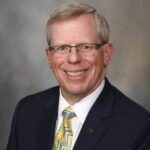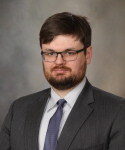AskMayoExpert — unique Mayo Clinic knowledge at point of care
Hundreds of thousands of times since 2001, Mayo Clinic physicians — and Mayo Clinic Care Network physicians — have looked to AskMayoExpert for answers. Now Mayo Clinic alumni can subscribe to this unique online tool.
 AskMayoExpert is a compendium of Mayo Clinic-vetted medical knowledge designed for use at the point of care by providers seeking answers to questions outside of their areas of expertise. John Wilkinson, M.D. (MED ’78, FM ’81), Department of Family Medicine at Mayo Clinic in Rochester and a member of the AskMayoExpert Knowledge Management and Delivery Oversight Group, describes AskMayoExpert as the 21st century electronic version of what Mayo Clinic has done for 150 years.
AskMayoExpert is a compendium of Mayo Clinic-vetted medical knowledge designed for use at the point of care by providers seeking answers to questions outside of their areas of expertise. John Wilkinson, M.D. (MED ’78, FM ’81), Department of Family Medicine at Mayo Clinic in Rochester and a member of the AskMayoExpert Knowledge Management and Delivery Oversight Group, describes AskMayoExpert as the 21st century electronic version of what Mayo Clinic has done for 150 years.
“When Mayo had a few hundred physicians in the Plummer Building, they all knew each other and could answer questions informally,” says Dr. Wilkinson. “Now that we’re much larger and more geographically spread out, we don’t always know who to consult for expert knowledge. To further complicate matters, medicine and care delivery today are so complex that they can’t be done by a single clinician with a patient. Medical care today requires a whole team and playbook.”
To develop AskMayoExpert content, Mayo Clinic physicians in various specialties meet as Knowledge Content Boards and cancer-disease groups. These 78 groups meet regularly to discuss topics to create, update and vet AskMayoExpert and review existing topics to determine any necessary changes. They collaborate to reach consensus about best practices for disease diagnosis, treatment and management in the case of care process models (clinical algorithms).
“AskMayoExpert represents the agreement of stakeholders across Mayo Clinic on a given topic — Mayo’s consensus about what we believe to be the best practice,” says Dr. Wilkinson. “Knowledge Content Boards call upon the expertise of Mayo colleagues who are leaders in the field of the topic at hand. We’ve yet to find a topic on which a Mayo physician or scientist doesn’t have recognized expertise.”
Dr. Wilkinson provides recent examples of how he uses AskMayoExpert. “I recently looked up colorectal cancer surveillance to get the latest expertise on the ongoing follow-up for a patient with colon polyps, which varies depending on the number, size and type of the patient’s specific polyps. I also looked up abdominal aortic aneurysm to determine treatment recommendations for a patient based on the size and rate of growth of the aneurysm and the patient’s blood pressure and smoking history.”
AskMayoExpert is dynamic, with content updated on demand when new a disease outbreak occurs, a medication becomes available or is discontinued, or national guidelines are evolving or unclear.
AskMayoExpert is dynamic, with content updated on demand when new a disease outbreak occurs, a medication becomes available or is discontinued, or national guidelines are evolving or unclear. Content on coronavirus was prepared and published within 24 hours as part of Mayo’s emergency preparedness plan. Heartburn topics were immediately updated when Zantac was recalled. Information on opioid prescribing was updated quickly to address the nationwide problem and help providers understand safe and appropriate prescribing recommendations for their patients. Hypertension topics are frequently updated to align with evolving guidelines and changes in practice. Recent feedback from AskMayoExpert users requested content on pleomorphic adenoma, new flash glucose monitoring systems, calculating a laboratory risk indicator for necrotizing fasciitis (LRINEC) score, and medical management of anal fissures.
Because many Mayo Clinic experts are members of the medical societies that determine national guidelines, Dr. Wilkinson says information from Mayo Clinic’s Knowledge Content Boards often drives national guidelines — putting AskMayoExpert on the forefront of emerging medical knowledge.
In the last six months, more than half of all Mayo Clinic consultants, residents and fellows used AskMayoExpert.
In the last six months, more than half of all Mayo Clinic consultants, residents and fellows used AskMayoExpert. Medical students, residents and fellows who trained at Mayo Clinic in the last decade are accustomed to routinely consulting AskMayoExpert. Many of those trainees have asked about continued access to AskMayoExpert after they’ve left Mayo Clinic. “They found AskMayoExpert to be indispensable in their practice,” says Dr. Wilkinson, “and we’re happy we can now provide it to our alumni via subscription.”
“They found AskMayoExpert to be indispensable in their practice, and we’re happy we can now provide it to our alumni via subscription.”
Improving quality via AskMayoExpert
In addition to being a repository of Mayo-vetted medical knowledge, AskMayoExpert is a clinical practice quality improvement tool.
 John (Jack) O’Horo, M.D. (CCMI ’14, CTSA ’14, INFD ’17), Division of Infectious Diseases at Mayo Clinic in Rochester, led research to standardize the way physicians treat febrile neutropenia. Dr. O’Horo developed a care process model for AskMayoExpert to guide providers through evidence-based antimicrobial selection and diagnostic evaluation of patients with this condition.
John (Jack) O’Horo, M.D. (CCMI ’14, CTSA ’14, INFD ’17), Division of Infectious Diseases at Mayo Clinic in Rochester, led research to standardize the way physicians treat febrile neutropenia. Dr. O’Horo developed a care process model for AskMayoExpert to guide providers through evidence-based antimicrobial selection and diagnostic evaluation of patients with this condition.
At the start of a yearlong period, 71% of patients with febrile neutropenia had at least one critical deviation from the best practice outlined in the care process model. Four months after the project was completed, the percentage had decreased to 33.3%.
“We were trying to determine the best way to reduce antibiotic overuse in patients with febrile neutropenia. The care process model in AskMayoExpert provided the perfect platform for delivering this data in a step-by-step approach,” says Dr. O’Horo. “The model allowed for a virtual consultation, identifying the key decision points a specialist would address in the first 24 hours of care for this vulnerable population. This process allowed us to converge medical practice across the Mayo enterprise and tap into the expertise of the entire institution, ultimately reducing antibiotic overuse.”
Dr. O’Horo’s study, which was published in the Journal of Oncology Practice, is an example of how to disseminate and implement consensus-based best practice knowledge, which successfully modified clinician practices and standardized care across a large, geographically dispersed organization.
AskMayoExpert at a glance
- Concise, online point-of-care resource
- Available 24/7/365
- Designed and used by Mayo Clinic providers
- Represents the latest Mayo-vetted expertise
- New topics added continually
- Reviewed and updated annually
- 456,993 unique visits in 2019
- 1,500 visits per day on average
- 1,365 topics including 270 care process models (algorithms)
- 21 new topics including 9 care process models added in 2019
Top 5 AME topics accessed most in in 2019
- Anticoagulation management (adult)
- Hyperlipidemia (adult)
- Colorectal cancer: screening and management (adult)
- Urinary tract infection (adult)
- Pneumonia (adult)
